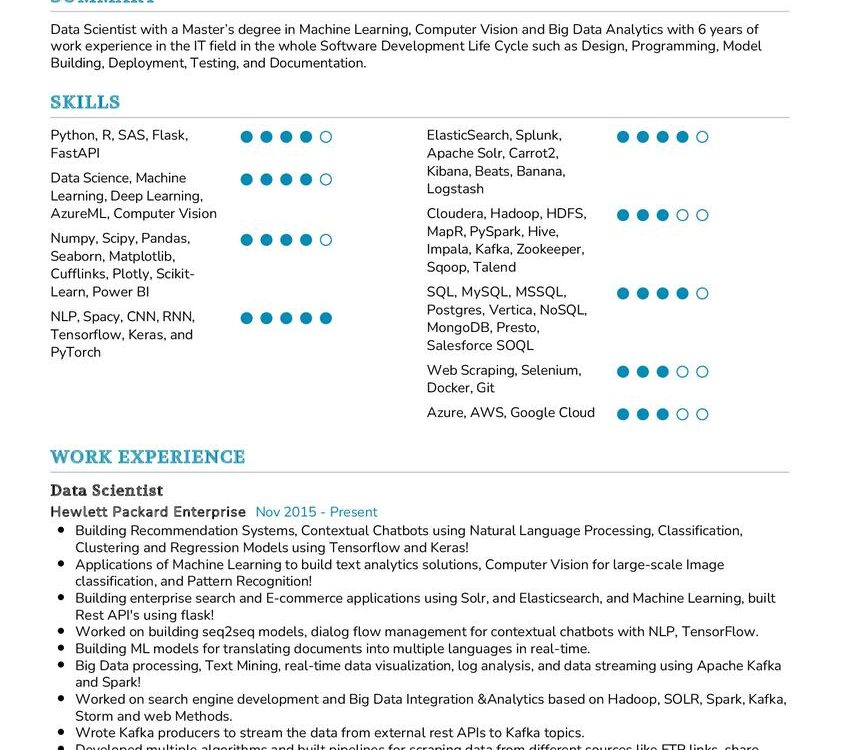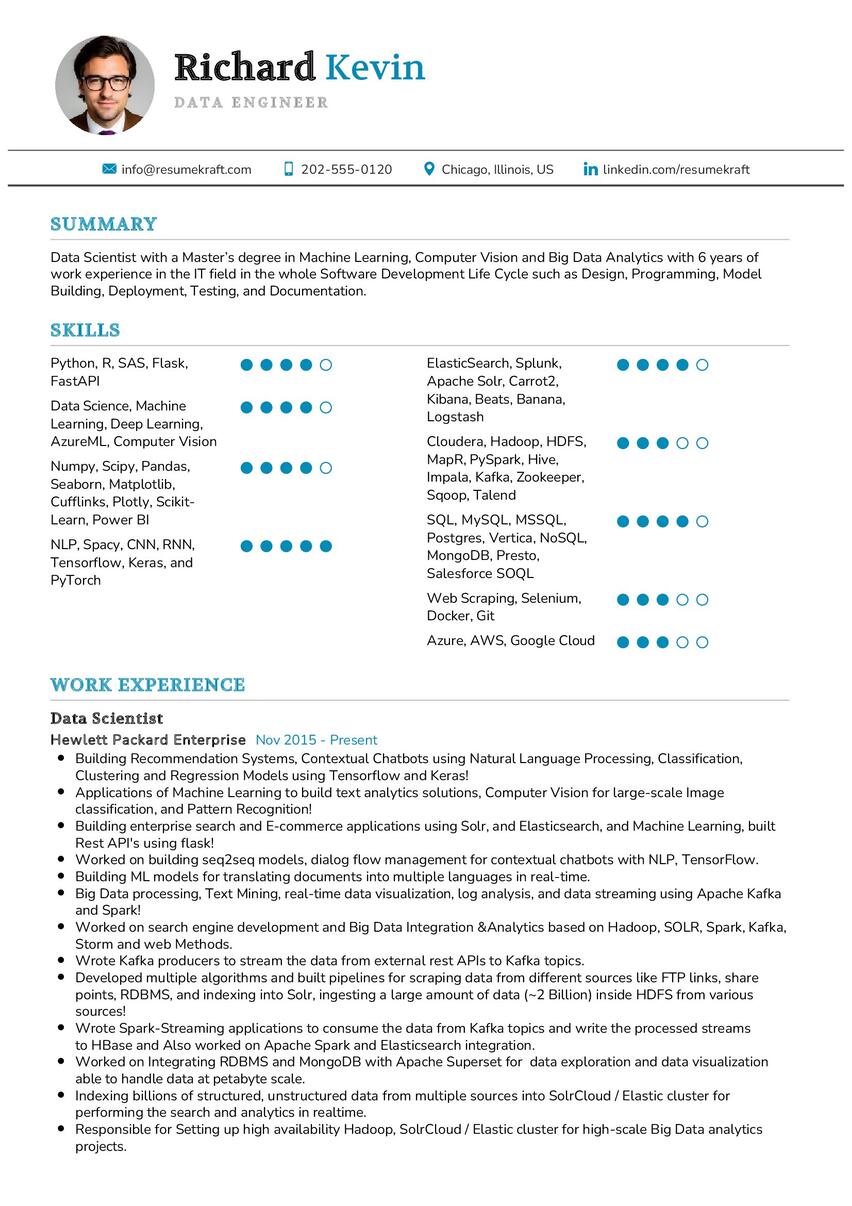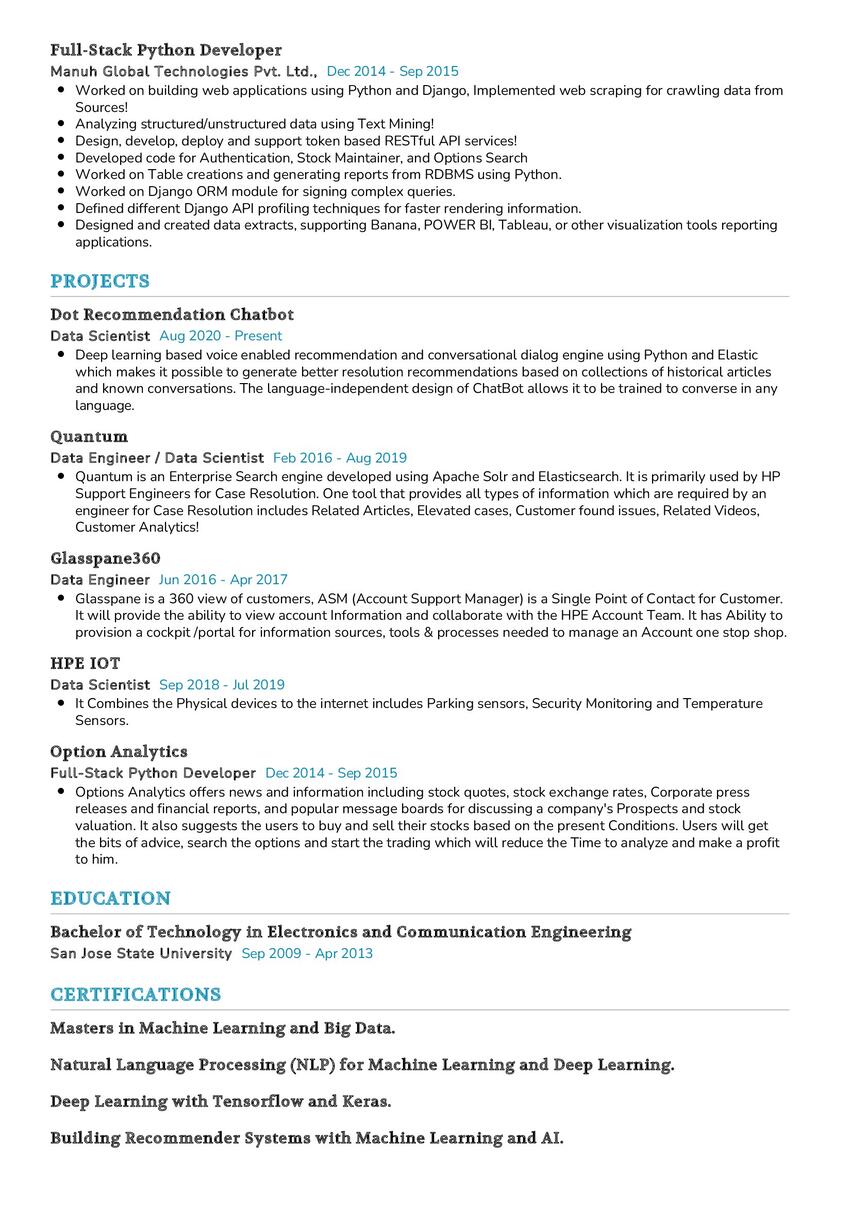Exploring the Role of a Data Engineer
The landscape of modern business is powered by data, and at the heart of this data-driven revolution is the role of a Data Engineer. In this digital era, the significance of a Data Engineer cannot be overstated. This article aims to unravel the multifaceted role of a Data Engineer, delving into their responsibilities, job requirements, and providing insights on crafting an impactful Data Engineer CV.
What are the Job Requirements for a Data Engineer?
Embarking on a career as a Data Engineer requires a unique set of skills and qualifications. Let’s explore the prerequisites that define the journey to becoming a proficient Data Engineer:
- A Bachelor’s or Master’s degree in Computer Science, Information Technology, or a related field, establishing a strong foundation in the technical domain.
- Expertise in database technologies, including but not limited to SQL, NoSQL, and data warehousing solutions.
- Hands-on experience in data modeling, ETL (Extract, Transform, Load) processes, and data pipeline development.
- Proficiency in programming languages such as Python, Java, or Scala, crucial for implementing data solutions.
- Familiarity with big data technologies like Hadoop, Spark, and distributed computing concepts.
- Strong analytical and problem-solving skills, essential for addressing complex data challenges.
- Excellent communication skills to collaborate with cross-functional teams and articulate data solutions effectively.
Additionally, obtaining certifications in relevant technologies such as AWS Certified Big Data – Specialty or Microsoft Certified: Azure Data Engineer Associate can enhance your CV and marketability.
Responsibilities of a Data Engineer
The role of a Data Engineer is dynamic, encompassing a wide range of responsibilities that contribute to the seamless flow of data within an organization. Here are the core responsibilities that define the role:
- Designing and implementing scalable and robust data architectures to support business needs.
- Developing and maintaining ETL processes for efficient data extraction, transformation, and loading.
- Collaborating with data scientists and analysts to understand data requirements and providing the necessary infrastructure.
- Ensuring data quality and integrity by implementing effective data validation and cleansing processes.
- Optimizing and tuning database systems for performance and reliability.
- Implementing security measures to protect sensitive data and ensuring compliance with data governance policies.
- Staying abreast of emerging trends and technologies in the data engineering landscape and recommending innovative solutions.
Each responsibility plays a crucial role in shaping a Data Engineer into a key player in an organization’s data strategy.
Data Engineer CV Writing Tips
Crafting a compelling Data Engineer CV is essential for standing out in a competitive job market. Here are some tips to help you create a CV that showcases your skills and experience effectively:
- Highlight specific data projects you’ve worked on, detailing the impact on the organization’s data infrastructure.
- Showcase your expertise in specific data tools and technologies, such as Apache Spark, Apache Kafka, or specific database systems.
- Quantify your achievements with metrics, demonstrating the tangible results of your data engineering initiatives.
- Include any relevant certifications or training programs you’ve completed, emphasizing your commitment to professional development.
- Customize your CV for each application, aligning your skills and experience with the specific requirements of the job.
Your CV is not just a document; it’s a reflection of your expertise and potential impact as a Data Engineer.
Data Engineer CV Summary Examples
Your CV summary serves as the introduction to your professional journey. Craft a powerful summary that encapsulates your skills and experience:
- “Results-driven Data Engineer with a proven track record in designing and implementing scalable data architectures, optimizing ETL processes, and enhancing overall data quality. Proficient in Python and Apache Spark, dedicated to driving data-driven decision-making in organizations.”
- “Experienced Data Engineer specializing in big data technologies and data warehouse solutions. Successfully led the implementation of data pipelines, resulting in a 30% improvement in data processing efficiency. Strong analytical and problem-solving skills.”
- “Detail-oriented Data Engineer with expertise in data modeling and database optimization. Led cross-functional teams to implement robust ETL processes, ensuring accurate and timely data delivery. Certified AWS Big Data Specialist with a commitment to staying updated on industry trends.”
Each summary is an opportunity to showcase your unique strengths and set the stage for a deeper exploration of your CV.
Building Your Data Engineer Experience Section
Your experience section is the heart of your CV, providing a detailed narrative of your journey as a Data Engineer. Here are some examples to guide you:
- “Led a team of data engineers in the development of a real-time data processing system using Apache Kafka, resulting in a 40% reduction in data latency.”
- “Implemented a data governance framework, ensuring compliance with industry regulations and enhancing data security measures.”
- “Collaborated with data scientists to deploy machine learning models into production, contributing to data-driven insights for business decision-making.”
Each experience is a chapter in your professional story, highlighting your contributions and impact in the field of data engineering.
Educational Background for Your Data Engineer CV
Your educational journey forms the foundation of your expertise as a Data Engineer. Showcase your academic achievements to strengthen your CV:
- Master of Science in Computer Science, XYZ University, 2019.
- Bachelor of Technology in Information Technology, ABC University, 2017.
- Microsoft Certified: Azure Data Engineer Associate, 2020.
Each educational qualification is a testament to your commitment to learning and staying updated in the ever-evolving field of data engineering.
Key Skills for Your Data Engineer CV
Your skill set is the toolbox that sets you apart as a Data Engineer. Highlight both technical and soft skills that are crucial for success in this role:
Technical Skills:
- Data modeling and database design
- ETL processes and data pipeline development
- Programming languages: Python, Java, Scala
- Big data technologies: Hadoop, Spark
- Data warehousing solutions
- SQL and NoSQL databases
Soft Skills:
- Analytical and problem-solving skills
- Effective communication and collaboration
- Attention to detail
- Adaptability to evolving technologies
- Project management
Each skill is a tool in your arsenal, contributing to your effectiveness as a Data Engineer.
Common Mistakes to Avoid in Your Data Engineer CV
Ensure your Data Engineer CV stands out for the right reasons by avoiding these common pitfalls:
- Avoid generic language; instead, use specific examples to highlight your achievements and contributions.
- Don’t focus solely on technical skills; emphasize your ability to collaborate and communicate effectively.
- Proofread meticulously to eliminate any errors or inconsistencies that may detract from your professional image.
- Avoid using jargon without context; explain technical terms to make your CV accessible to a broader audience.
- Don’t underestimate the importance of a well-crafted cover letter; use it to convey your passion for data engineering and your fit for the role.
Avoiding these mistakes ensures that your Data Engineer CV is a compelling representation of your skills and experience.
Key Takeaways for Your Data Engineer CV
As you craft your Data Engineer CV, keep these key points in mind to make a lasting impression on potential employers:
- Highlight your specific achievements and contributions in data engineering projects.
- Showcase your proficiency in relevant tools and technologies, emphasizing their impact on data solutions.
- Quantify your successes with measurable metrics, providing tangible evidence of your effectiveness as a Data Engineer.
- Include a section on continuous learning, featuring certifications and training programs that enhance your skill set.
Finally, feel free to utilize resources like AI CV Builder, CV Design, CV Samples, CV Examples, CV Skills, CV Help, CV Synonyms, and Job Responsibilities to create a standout application and prepare for the Data Engineer job interview.
Armed with these insights and tips, you are now ready to craft a CV that is a true reflection of your journey, your skills, and your aspirations as a Data Engineer. Best of luck!



